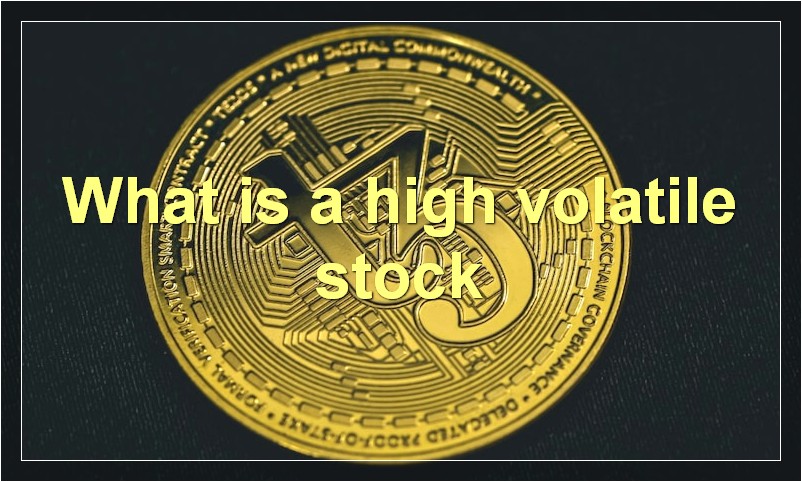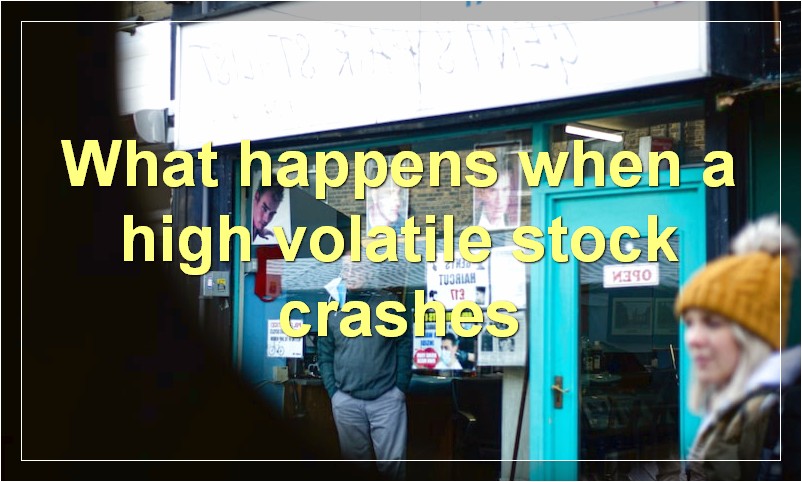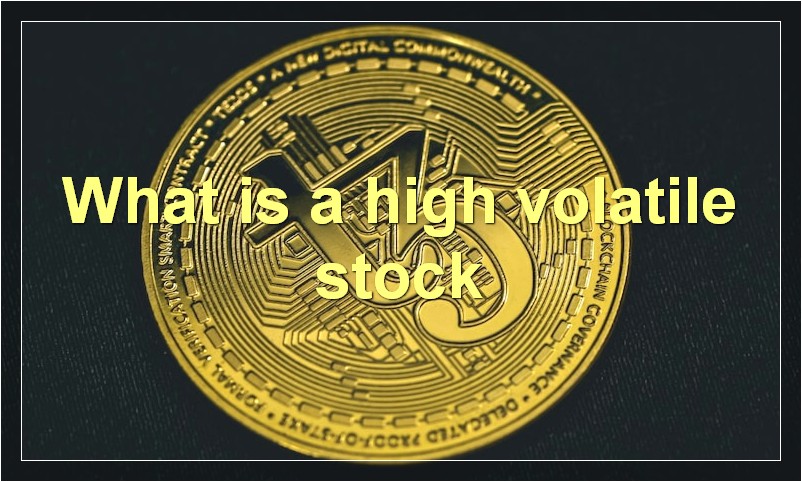If you’re looking to make a quick buck, high volatile stocks may be for you. But be warned – these stocks can just as easily lose value. Here’s everything you need to know before taking the plunge.
What is a high volatile stock

High volatile stocks are stocks that have a high degree of price fluctuation. They are often seen as risky investments, but can also offer high rewards. For investors looking for a high degree of price movement in their investments, high volatile stocks may be an ideal choice.
How do you identify a high volatile stock
There are a few things you can look for when trying to identify a high volatile stock. First, you can look at the historical price data for the stock. If the stock has had large swings in price over time, it is likely to be more volatile than a stock that has been relatively stable. You can also look at the beta for the stock, which measures how much the stock price moves in relation to the market. A high beta means that the stock is more volatile than the market, while a low beta means it is less volatile. Finally, you can look at analyst ratings for the stock. If analysts are expecting a lot of price movement in the stock, it is likely to be more volatile.
Why are high volatile stocks risky
High volatile stocks are considered to be risky because they can experience large swings in price. This means that investors could potentially lose a lot of money if they invest in a high volatile stock.
What are some examples of high volatile stocks
Volatile stocks are those that see large swings in price over short periods of time. They can be risky investments, but can also offer the potential for quick profits. Some examples of high volatile stocks include penny stocks, biotech stocks, and small-cap stocks.
What happens when a high volatile stock crashes

When a high volatile stock crashes, it can have a ripple effect on the entire market. This is because when a stock crashes, it causes investors to lose confidence in the market as a whole. When this happens, it can lead to a domino effect, where one stock crash leads to another. This can cause the market to plunge into a bear market, where stocks are sold off at a rapid pace.
How can you protect yourself from losses with high volatile stocks
Volatile stocks are those that experience large swings in price over a short period of time. They can be risky investments, but they can also offer the potential for large rewards. There are a few things you can do to protect yourself from losses when investing in volatile stocks.
First, it’s important to have a clear investment strategy. You should know why you’re buying a particular stock, and what your goals are for holding it. This will help you stay disciplined when prices start to fluctuate.
Second, don’t put all your eggs in one basket. Diversifying your portfolio across different asset classes will help to mitigate the risks associated with any one particular investment.
Finally, remember that timing is everything. When it comes to volatile stocks, it’s often best to “buy low and sell high.” If you can buy when prices are down and sell when they rebound, you stand to make a profit. However, this isn’t always easy to do. It takes patience and discipline to successfully execute this strategy.
What are the benefits of investing in high volatile stocks
1. High volatile stocks tend to outperform the market in the long run.
2. They are also less risky than lower volatile stocks.
3. High volatile stocks offer a higher potential return for investors.
4. They are more likely to generate higher capital gains in the long term.
5. Investing in high volatile stocks is a good way to diversify your portfolio and reduce overall risk.
Are there any strategies for safely investing in high volatile stocks
When it comes to investing in high volatile stocks, there are a few things you can do to minimize risk and maximize returns. First, make sure you have a clear understanding of the company and the stock before investing. Do your research and understand the potential risks involved.
Second, don’t invest more than you can afford to lose. Volatile stocks can go up or down quickly, so it’s important to only invest an amount that won’t hurt your finances if the stock takes a turn for the worse.
Third, consider using stop-loss orders when buying volatile stocks. A stop-loss order is an order to sell a security at a certain price point, which can help limit your losses if the stock price falls.
Finally, be prepared to hold onto your volatile stocks for the long haul. These stocks can be volatile in the short-term, but over time they tend to even out and provide good returns. If you’re patient and ride out the ups and downs, you can make a lot of money from investing in volatile stocks.
What should you do if you own a high volatile stock that crashes
What should you do if you own a high volatile stock that crashes?
The best thing to do is to sell the stock and take the loss. This is because a high volatile stock is more likely to continue crashing, and it is not worth holding onto a losing investment. Also, by selling the stock, you can use the loss as a tax deduction.

